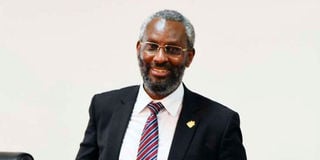Premium
UoN restructuring draws mixed reactions from dons, unions

University of Nairobi Vice Chancellor Stephen Kiama on July 9, 2021when he announced changes in the governance structures at the institution. The planned restructuring has drawn mixed reactions.
The planned restructuring of the University of Nairobi (UoN) has elicited mixed reactions from lecturers and union officials.
Last week, the university's council chairperson, Prof Julia Ojiambo, announced a major restructuring that could lead to job losses.
UoN has a total of 4,000 staff — 1,500 teaching and 2,500 non-teaching staff.
University Academic Staff Union (Uasu) Secretary-General Constantine Wasonga warned the management of the UoN against sacking its 1,500 teaching staff.
Gross understaffing
"We have a gross understaffing of academic staff and the union will not allow even a single teaching staff to be sacked through restructuring. The union will resist this move by UoN to force restructuring [down] its throat," said Dr Wasonga.
"The academic staff [were] not involved in this mess of over borrowing by the government. How did the government use the money it borrowed that has put pressure to sack academic and non-academic staff?
"The government should involve all the stakeholders before restructuring public universities, otherwise it should be prepared for industrial action," said Dr Wasonga.
At the same time, he said that all the 34 public universities are facing a serious shortage of teaching staff and instead of sacking them, the government should set aside adequate funds to bridge the widening gap by employing more academic staff.
He said the ratio of teaching staff against the non-teaching staff is 30:70.
"This ratio is not as per the Unesco guidelines which state the teaching staff should be 70 per cent and non-teaching staff should be 30 per cent," said Dr Wasonga.
University management
Kenya Universities Staff Union (Kusu) acting chairman Ernest Wayaya said the government has refused to confront the truth about the management of public universities.
"Public universities, like business entities, must be managed by people with business acumen. This belief that somebody who is a professor is so knowledgeable to lead a university as a vice-chancellor should be revisited," said Mr Wayaya.
"Due to this kind of thinking, majority of the public universities are going under in the hands that the society imagines is the best brains. We need industrialists like Manu Chandaria and Narendra Raval to be the vicechancellors of public universities and make the current VCs be their deputy VCs," he added.
"The VCs should be left to do academic work and leave the management of universities to business people who have been tested and proved to be industry captains of some of the most successful companies in Kenya and beyond," said Mr Wayaya.
Ethnic enclaves
He said the administration of public universities has been reduced to ethnic enclaves.
"We have never considered the correct yardstick to choose the correct managers for our public universities. The result is that public universities are going under as they are led by managers picked on tribal considerations," said Mr Wayaya.
He said many qualified people who are supposed to manage public universities have been sidelined because the universities they would wish to manage are not in their home areas.
The official said the union has reported cases of corruption and mismanagement to relevant authorities but no action has been taken against the suspects.
"Some public universities are spending millions of public funds to launch misplaced projects yet no action is taken against them despite the matter being reported to the relevant authorities," said Mr Wayaya.





